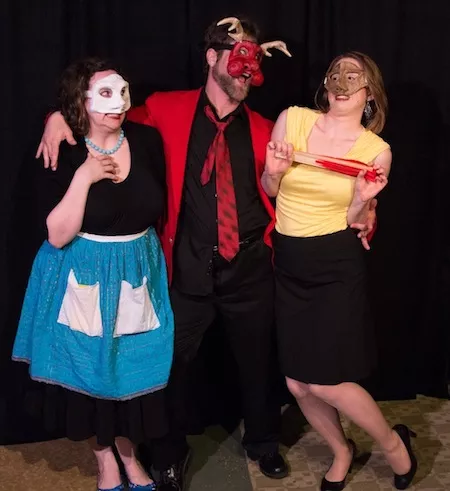Written after the two parts of Henry IV and before its sequel, Henry V, William Shakespeare's The Merry Wives of Windsor is the only play by the Bard to be set in his own time. There is very little blank verse in the script, which substantiates the supposition that the uncharacteristic prose piece was rushed through the assembly line at the command of Queen Elizabeth I in the space of just 14 days - and perhaps hastily premiered on the playwright's 33rd birthday.

The raison d'être for this merry comedy is the fat knight immortalized in the Henriad, Sir John Falstaff, whom Her Majesty wished to see in the throes of love. You can judge for yourself at UpStage in NoDa whether Shakespeare truly fulfilled the queen's command, in a fresh production by Citizens of the Universe that doesn't seem to take place in any specific era at all.
COTU director Megan Sky may not even be insisting that we view the motley crowd onstage as fully human. Most of them are put in masks designed by Citizens peace-keeper James Cartee. They accentuate the bestiality of the whole lot, and tip the balance of the emotion driving Sir John further away from spiritual love to animal lust. It's a bit disorienting at first, especially with so many people onstage. Their aims are nebulous and have no interest in Sir John, but once the central merriment kicks in, it's a jolly ride.
The critical wringing-of-hands over Shakespeare's retooling of an audience favorite has now continued for 417 years, despite the fact that Verdi's operatic version of the Merry Wives comedy, Falstaff, long ago made this lusty, bibbing version of Sir John into the one best-known and loved around the world. Minus about 100 pounds - and some of his "alacrity in sinking" - that is the Falstaff you'll find here, toting tankards big enough to make a dent in the weight differential by the end of COTU's run.
Inside a Cartee mask, David Pollack isn't merely red-faced as the dissolute knight, he's positively ruby, with bulbous cheeks hanging about his mouth. While the mask and its pendulous cheeks don't cover Pollack's mouth, a good portion of what he says seems to emanate Santa-wise from his gut. Nor is there any compelling reason for Sir John to be besotted by the crème de Windsor, for the plain fashions worn by Amanda Liles as Mistress Margaret Page and Farrell Paules as Mistress Alice Ford don't compensate for the disfigurements they suffer from their masks. Pure pleasures of the flesh, along with the delicacies afforded by a prosperous estate, must be their chief attractions.
Sundry suitors pursuing Margaret's daughter, Ann Page, mostly make the sybaritic Sir John look and sound elegant by comparison. Nancy Gaines takes the early lead as the most repellent suitor, spouting a thick brogue as the priestly Sir Hugh Evans - in a mask that has her looking like a gilded chipmunk. But she, um he, is eventually far overtaken by Doctor Caius, a Frenchman whose accent occasionally spills into Italy in Tom Ollis' booming rendition, once his voice gets past the sharp nauseating teeth of whatever hideous creature he might be in Cartee's most outré mask. My guess is a cross between a rabid beaver and a warthog.
Becca Thompson, one of the few performers not outfitted with a mask, gives a suspender-snapping dimension to Margaret's husband George that you'll never see anywhere else. Peter Engel doesn't need a mask as Frank Ford. His hyper-jealousy as Alice's husband is so intense that cartoon smoke seems to issue from his ears and hover over his head. Of course, Shakespeare screws the plot tension so prettily, humiliating Falstaff in three consecutive randy rendezvous with Mistress Ford. Meanwhile the wives' cleverness allows Sir John to neatly escape Frank's frantic searches, with exits right under his nose in his own home, stoking Frank's jealousy after each of the first two trysts.
The slapdash COTU production style probably carries over too much into the final midnight scene, where Falstaff's shame finally becomes public. More flamboyant extremes from the lightboard of darkness and fairy shimmer would help bring stronger accents to the magic and the farce. Yet Sky does deploy the spritely imposters all around the house, mingling with the audience and creating a neat demarcation between the masking Shakespeare wrote and the masking COTU has piled on.
No account of my impressions would be complete without a special shout-out to Deanna Pendragon aka Big Mamma D, the imperial immensity who portrays Miss Quickly - the hideous Doc Caius' bawdy emissary to the Page household. She actually my nominee to play Falstaff if COTU ever rolls him out again.
